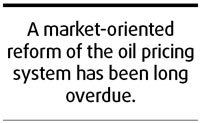Adapt to dearer oil
Updated: 2008-02-21 07:27
Triple-digit oil prices will surely complicate the Chinese government's efforts to fight domestic inflation. Yet, policymakers should face it with a greater sense of urgency to reform the country's energy pricing system.

International oil prices closed above $100 a barrel on Tuesday, shrugging off increasing evidence of a US recession.
When it briefly touched the once unfathomable price for the first time early last month, it seemed fairly reasonable to expect that the ongoing US slowdown would ease demand and lead to a sharp fall in oil prices.
The recent strong rebound after dropping by nearly 15 percent since then, however, has made it clear that consumers should better prepare themselves for more expensive oil.
For China, a net oil importer with a growing appetite, this is not good news.
The country's net imports of crude oil climbed to 159.28 million tons last year, up 14.7 percent. Some 46 percent of its crude oil consumption is met by imports.
Higher oil prices means China will have to pay substantially more for imports. This is not so serious a problem at the moment when the country is trying to slow its accumulation of trade surplus.
But the extra cost that the current energy pricing mechanism will incur to keep the lid on domestic oil prices is highly worrisome.
At present, the price of crude oil in China is set by the global market while the refined price is regulated by the government. Instead of raising the refined price, the central government subsidizes refiners for their loss due to higher import costs.
The comparatively lower domestic prices of refined oil products can help prevent consumer inflation from running out of control. But the cost the government and refiners share to support lower domestic oil prices is too dear, which is estimated to reach 170 billion yuan last year, 0.9 percent of the country's gross domestic product.
The negative impact such oil subsidies have on the country's efforts to raise energy efficiency is even worse. It is all too clear that low oil prices play right into the hands of inefficient energy-consumers.
A market-oriented reform of the oil pricing system has been long overdue. The country's high inflation should not be made an excuse to further postpone it.
Procrastination on reform will only add to the inefficiency of the economy and impede the country's preparation for the coming era of expensive oil.
(China Daily 02/21/2008 page8)
|
|
|
|
|
|